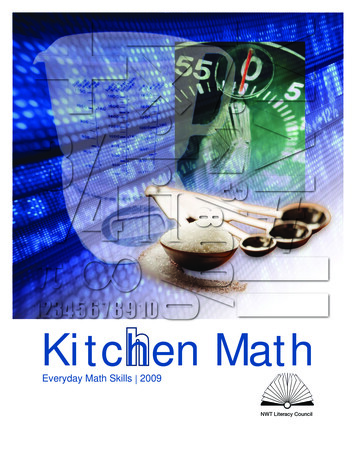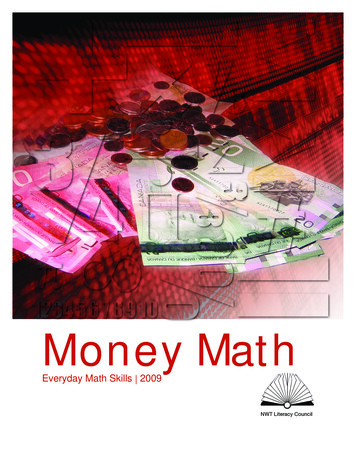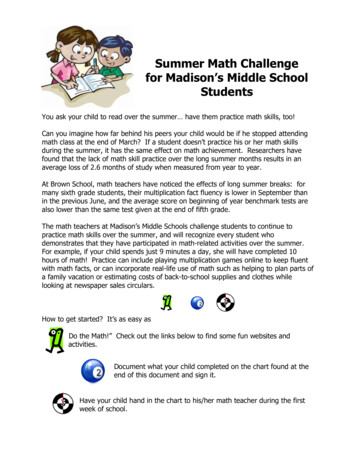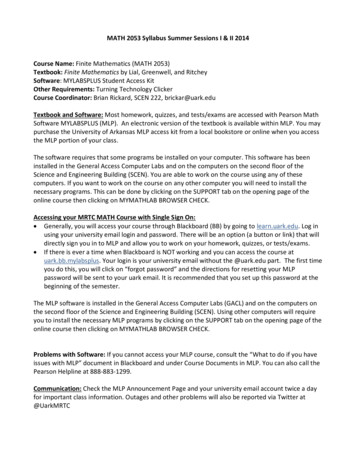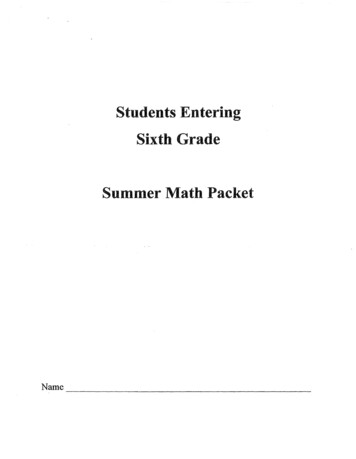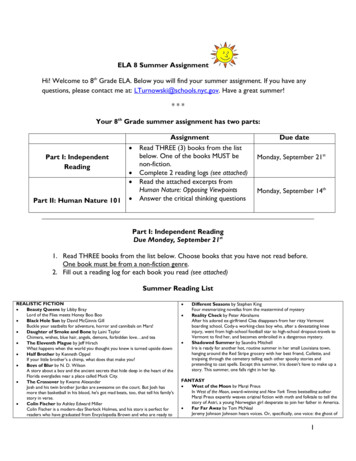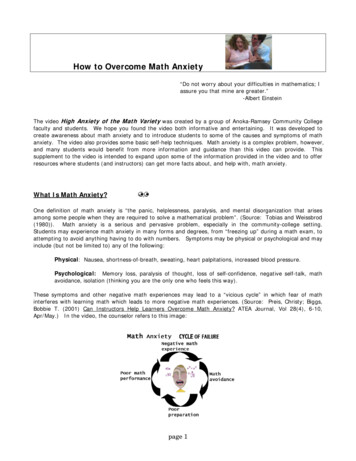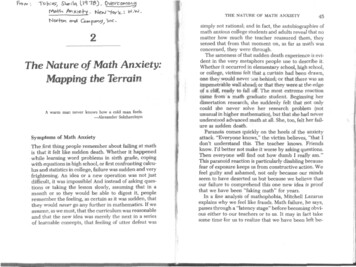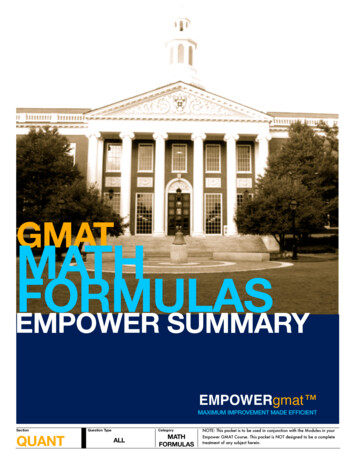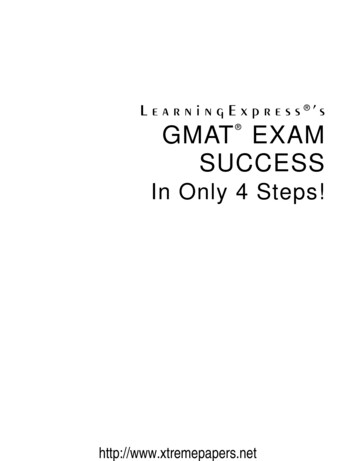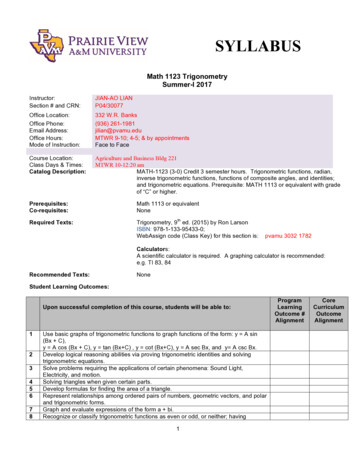
Transcription
SYLLABUSMath 1123 TrigonometrySummer-I 2017Instructor:Section # and CRN:JIAN-AO LIANP04/30077Office Location:Office Phone:Email Address:Office Hours:Mode of Instruction:332 W.R. Banks(936) 261-1981jilian@pvamu.eduMTWR 9-10; 4-5; & by appointmentsFace to FaceCourse Location:Class Days & Times:Catalog Description:Agriculture and Business Bldg 221MTWR 10-12:20 amMATH-1123 (3-0) Credit 3 semester hours. Trigonometric functions, radian,inverse trigonometric functions, functions of composite angles, and identities;and trigonometric equations. Prerequisite: MATH 1113 or equivalent with gradeof “C” or higher.Prerequisites:Co-requisites:Math 1113 or equivalentNoneRequired Texts:Trigonometry, 9 ed. (2015) by Ron LarsonISBN: 978-1-133-95433-0;WebAssign code (Class Key) for this section is:thpvamu 3032 1782Calculators:A scientific calculator is required. A graphing calculator is recommended:e.g. TI 83, 84Recommended Texts:NoneStudent Learning Outcomes:Upon successful completion of this course, students will be able to:12345678Use basic graphs of trigonometric functions to graph functions of the form: y A sin(Bx C),y A cos (Bx C), y tan (Bx C) , y cot (Bx C), y A sec Bx, and y A csc Bx.Develop logical reasoning abilities via proving trigonometric identities and solvingtrigonometric equations.Solve problems requiring the applications of certain phenomena: Sound Light,Electricity, and motion.Solving triangles when given certain parts.Develop formulas for finding the area of a triangle.Represent relationships among ordered pairs of numbers, geometric vectors, and polarand trigonometric forms.Graph and evaluate expressions of the form a bi.Recognize or classify trigonometric functions as even or odd, or neither; having1ProgramLearningOutcome #AlignmentCoreCurriculumOutcomeAlignment
91011121314symmetry relative to a specified point or line, periodic, increasing or decreasing.Graph trigonometric relations, trigonometric functions and their inverses.Evaluate trigonometric expressions of functions for special angles as well as thoserequiring use of technology or trigonometric tables.Convert to its equivalent: functions and co-function relation and inverse relation,complex and polar, radian and degrees, and half angle and double angle.Simplify trigonometric expressions and perform basic operations on complex numbersand trigonometric functionsFind arc lengths, angular speed, and linear velocityComplete an exponential project utilizing and exploring technology.Major Course RequirementsMethod of Determining Final Course GradeCourse Grade Requirement1)2)3)4)6)7)8)9)Total:HomeworkExam 1Exam 2 (Midterm)Exam 3AttendanceEvaluationsTaskstreamFinal %5%5%5%25%100%Grading Criteria and Conversion:A 90 – 100%B 80 – 89%C 70 – 79%D 60 – 69%F 0 – 59%Detailed Description of Major Assignments:AssignmentTitle or GradeDescriptionRequirementExaminationsAll exams will consist of essay type written tests designed to measure knowledge of presentedcourse material. The midterm exam and the final exam are to be done in class. Scientificcalculators are allowed and a formula sheet may be provided.Departmental policies on exams and technology1. no multiple choice question is allowed on any test at any level.2. any and all types of technology is allowed to be used by students in class, onassignments and on tests throughout the academic years.Tests and quizzes will be developed to minimize any possible dishonesty.HomeworkAll homework problems are to be done using WebAssign to enhance the understanding of thematerial. The publisher has supplements freely available online. Go tohttp://www.webassign.net/login.html to register and do the homework. A 14-day grace periodof non-purchase of WebAssign code is granted to all students. At the end of the grace period,students must purchase the WebAssign code (also called Class Key) for continued access of theprogram. The WebAssign code (Class Key) for this section is: pvamu 3032 17822
WeekTopics1Introduction to WebAssign1.1 Radian and Degree Measure1.2 Trigonometric Functions: The Unit Circle1.3 Right Triangle Trigonometry1.4 Trigonometric Functions of Any Angle1.5 Graphs of Sine and Cosine Functions1.6 Graphs of Other Trigonometric FunctionsReview and Exam 1: Covers 1.1 – 1.73 hours1.7 Inverse Trigonometric Functions1.8 Applications and Models2.1 Using Fundamental Identities2.2 Verifying Trigonometric Identities2.3 Solving Trigonometric Equations2.4 Sum and Difference FormulasReview and Midterm exam: Covers Chapters 1 and 1.7 – 2.43 hours2345678910112.5 Multiple Angles and Product-to-Sum Formulas3.1 Law of Sines3.1 cont’d3.2 Law of Cosines3.3 Vectors in the Plane3.4 Vectors and Dot Products123 hours3 hours3 hours3 hours3 hours3 hours3 hours3 hours3 hoursReview and Exam 3 Covers 2.5 – 3.4131415164.1 Complex Numbers4.2 Complex Solutions of Equations4.3 Trigonometric Form of a Complex Number4.4 DeMoivre’s Theorem6.7 Polar Coordinates6.8 Graphs of Polar Equations and Euler’s Formula (Supplement)Review Comprehensive Final exam33 hours3 hours3 hours3 hours
Course Procedures or Additional Instructor PoliciesTaskstreamTaskstream is a tool that Prairie View A&M University uses for assessment purposes. At least one ofyour assignments is REQUIRED to be submitted as an "artifact,” an item of coursework that serves asevidence that course objectives are met. More information will be provided during the semester, but forgeneral information, you can visit Taskstream via the link in eCourses.Student Support and SuccessJohn B. Coleman LibraryThe library and its partners have as their mission to provide resources and instructional material insupport of the evolving curriculum, as a partner in Prairie View A&M University's mission ofteaching, research, and service and to support the University's core values of access and quality,diversity, leadership, relevance, and social responsibility through emphasis on ten key areas ofservice. It maintains library collections and access both on campus, online, and through localagreements to further the educational goals of students and faculty.https://www.pvamu.edu/library/ Phone: 936-261-1500The Learning Curve (Center for Academic Support)The Learning Curve offers Tutoring via peer tutoring. The services include workshops (i.e., SaveMy Semester, Recalculate Your Route), seminars (i.e., Tools You Can Use: TI-84), group reviewsessions (i.e., College Algebra Topic Reviews, GRE Preparation), group study opportunities (i.e.,TSIA, HESI, Study Break, Exam Cram), and test-taking strategies (How to take Notes, StudyBuddy, 5 Day Study Guide). The Learning Curve is a nationally certified tutoring program throughthe National Tutoring Association. The peer tutors are trained and certified by the coordinatoreach semester. Location: J.B. Coleman Library Rm. 207F. Phone: 936-261-1561The Center for the Oversight and Management of Personalized Academic Student Success(COMPASS)The Center for the Oversight and Management of Personalized Academic Student Success(COMPASS) is designed to help Prairie View students in their second year and beyond navigatetowards graduation by providing the following services: Academic Advisement, Targeted Tutorialsfor Personalized Learning, Campus-Wide Referrals, and Academic & Social Workshops. Location:J.B. Coleman Library Rm. 306. Phone: 936-261-1040Writing CenterThe Writing Center provides student consultants on all aspects of the writing process and a varietyof writing assignments. Writing Center consultations assist students in such areas as prewriting,brainstorming, audience awareness, organization, research, and citation. Students taking on-linecourses or courses at the Northwest Houston Center or College of Nursing may consult remotelyor by email. Location: Hilliard Hall Rm. 121. Phone: 936-261-3724.Student Counseling ServicesThe Student Counseling Services unit offers a range of services and programs to assist studentsin maximizing their potential for success: short-term individual, couples, and group counseling, aswell as crisis intervention, outreach, consultation, and referral services. The staff is licensed by theState of Texas and provides assistance to students who are dealing with academic skillsconcerns, situational crises, adjustment problems, and emotional difficulties. Information sharedwith the staff is treated confidentially and in accordance with Texas State Law. Location: OwensFranklin Health Center Rm. 226. Phone: 936-261-35644
TestingThe Department of Testing administers College Board CLEP examinations, the HESI A2 for prenursing majors, LSAT for law school applicants and MPRE for second-year law students, theExperiential Learning Portfolio option, the Texas Success Initiative (TSI) Assessment, whichdetermines college readiness in the state, and exam proctoring, among other service such as SATand ACT for high school students. Location: Delco Rm. 141. Phone: 936-261-4286Office of Diagnostic Testing and Disability ServicesAs a federally-mandated educational support unit, the Office of Disability Services serves as therepository for confidential disability files for faculty, staff, and students. For persons with adisability, the Office develops individualized ADA letters of request for accommodations. Otherservices include: learning style inventories, awareness workshops, accessibility pathways,webinars, computer laboratory with adapted hard and software, adapted furniture, proctoring ofnon-standardized test administrations, ASL interpreters, ALDs, digital recorders, livescribe,Kurtzweil, and a comprehensive referral network across campus and the broadercommunity. Location: Evans Hall Rm. 317. Phone: 936-261-3585Veteran AffairsVeterans Services works with student veterans, current military and military dependents to supporttheir transition to the college environment and continued persistence to graduation. The Officecoordinates and certifies benefits for both the G.I. Bill and the Texas Hazlewood Act. Location:Evans Hall Rm. 323. Phone: 936-261-3563Office for Student EngagementThe Office for Student Engagement delivers comprehensive programs and services designed tomeet the co-curricular needs of students. The Office implements inclusive and accessibleprograms and services that enhance student development through exposure to and participationin diverse and relevant social, cultural, intellectual, recreational, community service, leadershipdevelopment and campus governance. Location: Memorial Student Center Rm. 221. Phone: 936261-1340Career ServicesCareer Services supports students through professional development, career readiness, andplacement and employment assistance. The Office provides one-on-one career coaching,interview preparation, resume and letter writing, and career exploration workshops andseminars. Services are provided for students at the Northwest Houston Center and College ofNursing in the Medical Center twice a month or on a requested basis. Distance Learning studentsare encouraged to visit the Career Services website for information regarding services provided.Location: Evans Hall Rm. 217. Phone: 936-261-3570University Rules and ProceduresDisability Statement (Also See Student Handbook):The Americans with Disabilities Act (ADA) is a federal anti-discrimination statute that providescomprehensive civil rights protection for persons with disabilities. Among other things, thislegislation requires that all students with disabilities be guaranteed a learning environment thatprovides for reasonable accommodation of their disabilities. If you believe you have a disabilityrequiring an accommodation, please contact Disability Services, in Evans Hall, Room 317, or call936-261-3585/3.Academic Misconduct (See Student Handbook):You are expected to practice academic honesty in every aspect of this course and all other5
courses. Make sure you are familiar with your Student Handbook, especially the section onacademic misconduct. Students who engage in academic misconduct are subject to universitydisciplinary procedures.Forms of Academic Dishonesty:1. Cheating: deception in which a student misrepresents that he/she has masteredinformation on an academic exercise that he/she has not mastered; giving or receivingaid unauthorized by the instructor on assignments or examinations.2. Academic misconduct: tampering with grades or taking part in obtaining or distributingany part of a scheduled test.3. Fabrication: use of invented information or falsified research.4. Plagiarism: unacknowledged quotation and/or paraphrase of someone else’s words,ideas, or data as one’s own in work submitted for credit. Failure to identify informationor essays from the Internet and submitting them as one’s own work also constitutesplagiarism.Nonacademic Misconduct (See Student Handbook)The university respects the rights of instructors to teach and students to learn. Maintenance ofthese rights requires campus conditions that do not impede their exercise. Campus behavior thatinterferes with either (1) the instructor’s ability to conduct the class, (2) the inability of otherstudents to profit from the instructional program, or (3) campus behavior that interferes with therights of others will not be tolerated. An individual engaging in such disruptive behavior may besubject to disciplinary action. Such incidents will be adjudicated by the Dean of Students undernonacademic procedures.Sexual Misconduct (See Student Handbook):Sexual harassment of students and employers at Prairie View A&M University is unacceptableand will not be tolerated. Any member of the university community violating this policy will besubject to disciplinary action.Title IX StatementPrairie View A&M University (PVAMU) is committed to supporting students and complying with theTexas A&M University System non-discrimination policy. It seeks to establish an environment thatis free of bias, discrimination, and harassment. If you experience an incident of sex- or genderbased discrimination, including sexual harassment, sexual assault or attempted sexual assault,we encourage you to report it. While you may talk to a faculty member about an incident ofmisconduct, the faculty member must report the basic facts of your experience to Ms. AlexiaTaylor, PVAMU’s Title IX Coordinator. If you would like to speak with someone who may be ableto afford you privacy or confidentiality, there are individuals who can meet with you. The Title IXCoordinator is designated to handle inquiries regarding non-discrimination policies and can assistyou with understanding your options and connect you with on- and off-campus resources. TheTitle IX Coordinator can be reached by phone at 936-261-2123 or in Suite 013 in the A.I. ThomasAdministration Building.Class Attendance Policy (See Catalog for Full Attendance Policy)Prairie View A&M University requires regular class attendance. Attending all classes supports fullacademic development of each learner whether classes are taught with the instructor physicallypresent or via distance learning technologies such as interactive video and/or internet.Excessive absenteeism, whether excused or unexcused, may result in a student’s course grade6
being reduced or in assignment of a grade of “F”. Absences are accumulated beginning with thefirst day of class during regular semesters and summer terms. Each faculty member will includethe University’s attendance policy in each course syllabus.Student Academic Appeals ProcessAuthority and responsibility for assigning grades to students rests with the faculty. However, inthose instances where students believe that miscommunication, errors, or unfairness of any kindmay have adversely affected the instructor's assessment of their academic performance, thestudent has a right to appeal by the procedure listed in the Undergraduate Catalog and by doingso within thirty days of receiving the grade or experiencing any other problematic academic eventthat prompted the complaint.TECHNICAL CONSIDERATIONSMinimum Recommended Hardware and Software: Intel PC or Laptop with Windows 7; Mac with OS X; Smartphone or iPad/Tablet with Wi-Fi High speed Internet access 8 GB Memory Hard drive with 320 GB storage space 15” monitor, 800x600, color or 16 bit Sound card w/speakers Microphone and recording software Keyboard & mouse Most current version of Google Chrome, Safari, Internet Explorer or FirefoxNote: Be sure to enable Java & pop-ups in the Web browser preferencesParticipants should have a basic proficiency of the following computer skills: Sending and receiving email A working knowledge of the Internet Proficiency in Microsoft Word (or a program convertible to Word) Proficiency in the Acrobat PDF Reader Basic knowledge of Windows or Mac O.S.Netiquette (online etiquette):Students are expected to participate in all discussions and virtual classroom chats as directed.Students are to be respectful and courteous to others on discussions boards. Foul or abusivelanguage will not be tolerated.Technical Support:Students should go to https://mypassword.pvamu.edu/ if they have password issues. Thepage will provide instructions for resetting passwords and contact information if login issuespersist. For other technical questions regarding eCourses, call the Office of Distance Learningat 936-261-3283Communication Expectations and Standards:Emails or discussion postings will receive a response from the instructor, usually in less than48 hours. Urgent emails should be marked as such. Check regularly for responses.Discussion Requirement:Online courses often require minimal to no face-to-face meetings. However, conversationsabout the readings, lectures, materials, and other aspects of the course can take place in aseminar fashion. This will be accomplished by the use of the discussion board. The exact useof discussion will be determined by the instructor.It is strongly suggested that students type their discussion postings in a word processing7
application and save it to their PC or a removable drive before posting to the discussionboard. This is important for two reasons: 1) If for some reason your discussion responsesare lost in your online course, you will have another copy; 2) Grammatical errors can begreatly minimized by the use of the spell-and-grammar check functions in word processingapplications. Once the post(s) have been typed and corrected in the word processingapplication, it/they should be copied and pasted to the discussion board.8
nursing majors, LSAT for law school applicants and MPRE for second-year law students, the Experiential Learning Portfolio option, the Texas Success Initiative (TSI) Assessment, which determines college readiness in the state, and exam proctoring, among other service such as SAT and ACT for high school students. Location: Delco Rm. 141.
